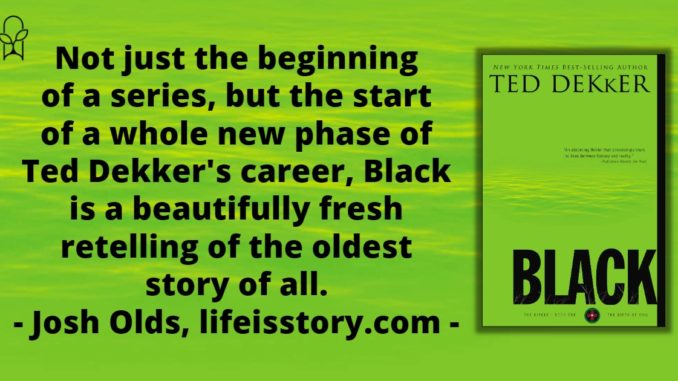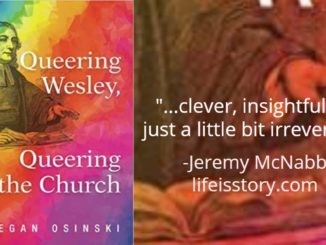
Also by this author: The Promise, The Drummer Boy, Sinner, Green, The Dream Traveler's Quest, Into the Book of Light, The Curse of Shadownman, The Garden and the Serpent, The Final Judgment, Millie Maven and the Bronze Medallion
Series: The Circle Series #1
Published by Thomas Nelson on February 2004
Genres: Fiction, Christian, Fantasy, Suspense
Buy on Amazon
Goodreads

Enter an adrenaline-laced epic where dreams and reality collide.
Fleeing his assailants through deserted alleyways, Thomas Hunter narrowly escapes to the roof of a building. Then a silent bullet from the night clips his head...and his world goes black.
From the blackness comes an amazing reality of another world-a world where evil is contained. A world where Thomas Hunter is in love with a beautiful woman. Then he remembers the dream of the chase as he reaches to touch the blood on his head.
Where does the dream end and reality begin? Every time he falls asleep in one world, he awakes in the other-both facing catastrophic disaster. Thomas is being pushed beyond his limits...even beyond the limits of space and time.
Black is an incredible story of evil and rescue, betrayal and love, pursuit and death, and a terrorist's threat unlike anything the human race has ever known.
Some say the world hangs in the balance of every choice we make. Now the fate of two worlds hangs in the balance of one man's choice.
It all began with a single, silenced bullet out of nowhere…And with that sentence my life changed. I don’t make that statement lightly. The Circle Trilogy served as the catalyst that threw me back into the world of fiction. It was because of these three books that I fell in love with Story. A lot of who I am can be traced back to Christmas 2004 when I unwrapped these three books and spent the next few days glued to the page.
Black, the first installment of The Circle Trilogy, sets the stage for the epic that is to come. Thomas Hunter, on the run from the mob, is shot and wakes up in the Black Forest. He is almost killed by giant black bats before a fuzzy white bat helps lead him out of the forest and across the bridge to the Colored Forest. Thomas is soon plunged deep into a brand-new world, a place where Good and Evil are clearly seen, where Evil is contained in the Black Forest and the people of Elyon live without sin or shame in the Colored Forest. It’s Paradise. A new Eden. A future where history seems to be repeating itself. A future that says Thomas’s world was destroyed.
But when Thomas Hunter falls asleep in the Colored Forest, he reawakens back in Denver, dazed, confused, still on the run from the mob. But now he is convinced that his—dreams?—of the other world are real as well, and that he must stop the virus that destroys this world. Then, when he dreams, he must not only acclimate to this new world, but also prevent a cataclysm from happening there as well. The fate of two worlds hangs in the balance of the decisions of one man.
In one world, an apocalyptic scenario threatens to destroy the world; in another, an even more apocalyptic scenario threatens to undo paradise and unleash evil. Dekker’s scope is magnificent and his allegory flawless as he builds his mythos as the Trilogy retells redemptive history.
Dekker takes the old, old Story and paints it in a brand-new light, helping readers see past the clichéd thoughts of what we think we know about God and discovering Him again in a whole new way. His portrayal of the God-figure, Elyon, is beautiful and enchanting, breaking down the image of God as a relatively uninterested bearded grandfather figure and replacing it with a God who is excited for His creation and loves it dearly.
There is a lot more I could say about this series. Now almost twenty years old, it has stood the test of time—and even Dekker’s own attempts to enlarge the series. (More on that in later reviews). At this point in Ted’s career, he was finally coming into his own. Both Blink and Thr3e had been critical successes, with Thr3e going on to win a Christy Award. But Dekker had never written anything like this before. His books were thrillers, not fantasy.
Thomas Nelson took a huge risk with Ted, deciding to publish all three novels over the course of one year. Dubbed the “Year of the Trilogy,” 2004 became Ted’s breakout year and the story he told here would affect the stories he wrote for the next half-decade and beyond.
Every time I reread these novels, I forget how much of happens in “Real Earth.” Dekker’s “Other Earth” storyline is so captivating that the story in this timeline just sort of fades into the background. That’s probably because while the Real Earth storyline is a good one, it’s a little generic and filled with your stereotypical characters. There’s the Big Bad (Svenson) who wants to make over the world and is willing to kill billions to do so. There’s his Top Assassin (Carlos) who is mostly just a hired gun and, of course, a Muslim. And there’s the unlikely Chosen One (Thomas) who can save all of humanity. The hook to this otherwise generic thriller is that every time Thomas Hunter falls asleep in this reality, he wakes up in another.
Dekker’s world-building is incredible. The allegories are so blatant and obvious that it shouldn’t work, but it’s done with an intricacy and vitality that helps readers see God in new light. Dekker imagines what might have been had Eden been extended for generations and a whole community of people lived in sinless perfection in a perfect world. And dropped into that world is Thomas Hunter, whose presence upsets the balance of powers and leads the world into apocalypse.
It’s that imagination of a paradise lost that drives Black. There’s no doubt where this story is going. Subtitled “The Birth of Evil” and building so clearly on redemptive history, we know where the story is going. And yet Dekker manages to hold our attention by imagining with us what exactly is lost. Allegory is really difficult to write. It’s often stilted, lacking in nuance, or better suited to shorter literary formats than a novel—let alone a series. Dekker weaves together a storyline where there’s meaning bursting behind every character and every decision.
Despite being one of his most famous works today, Black represented a huge departure from what Ted had built his career on to that date. Black is not just the beginning of a series, but the start of a whole new phase of Ted Dekker’s career – a beautifully fresh retelling of the oldest story of all.





Be the first to comment